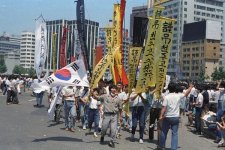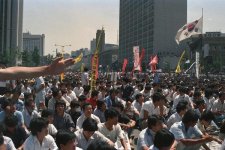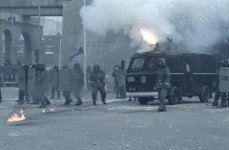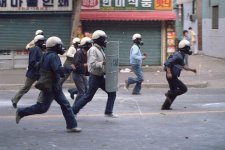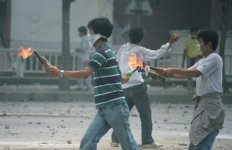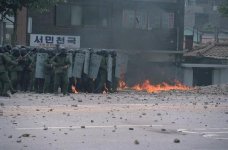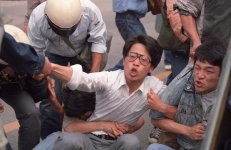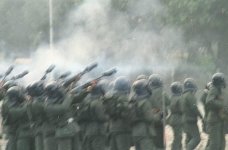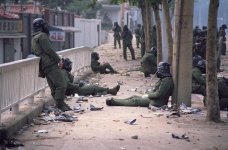Belle
Established
I took these photographs some twenty plus years ago when South Korea was at the cross roads of moving from dictatorship to a democracy. The student lead movement resulted in free elections, freedom of press, and a democratically elected president. Today, South Korea is a fully democratic country.
I was compelled to post these image after watching what is unfolding in Iran right now. I hope the Iranians achieve their goal of gaining freedom and basic rights.
I was compelled to post these image after watching what is unfolding in Iran right now. I hope the Iranians achieve their goal of gaining freedom and basic rights.
Attachments
Belle
Established
Belle
Established
Pablito
coco frío
WOW! Looks like you were right in the middle of it.
zenlibra
Crazy Leica Fox
Belle, those are some compelling shots.
35mmdelux
Veni, vidi, vici
People get what they are willing to accept. Freedom comes at a price. At some point dictators get the message and leave town-- Samosa, Marcos, Ceauşescu -- but not until they have murdered everyone that challenged their authority.
Until there is democracy and the rule of law in fact, there will be a polarization of economic power resulting in a few rich groups and the others poor -- this is the model that most of the people of the world have been willing to accept.
Until there is democracy and the rule of law in fact, there will be a polarization of economic power resulting in a few rich groups and the others poor -- this is the model that most of the people of the world have been willing to accept.
Pablito
coco frío
Luxlover
Member
Great photos. You should have worked for a news service.
Speaking of Iran, do you really think those in power are going to give that up for the sake of the people. No way. They will get their bullies to murder people in the streets, gather up and imprison or kill all that disagree and act upon it.
Same old dictators, different names, that's all.
Luxlover
Speaking of Iran, do you really think those in power are going to give that up for the sake of the people. No way. They will get their bullies to murder people in the streets, gather up and imprison or kill all that disagree and act upon it.
Same old dictators, different names, that's all.
Luxlover
Belle
Established
If you look in the second set of photos. The guys in white motorcycle helmets were ex-cons and thugs that the dictator brought in to do all the heavy beating and bashing. The riot police in green were just soldiers force to do their job.
In the case of Korea, the momentum was enormous, international pressure high, and the Olympics just around the corner. In addition, you had a highly educated and media savvy middle class who were the majority. The dictator eventually buckled and opened themselves up to free elections. The media also opened up. People were no longer buying into propaganda.
I do see some parallels, but what strikes me most about Iran is the sheer number of women fighting for their rights too.
I was too young to know then, but I really appreciate freedom and basic rights that I have, living here in America.
In the case of Korea, the momentum was enormous, international pressure high, and the Olympics just around the corner. In addition, you had a highly educated and media savvy middle class who were the majority. The dictator eventually buckled and opened themselves up to free elections. The media also opened up. People were no longer buying into propaganda.
I do see some parallels, but what strikes me most about Iran is the sheer number of women fighting for their rights too.
I was too young to know then, but I really appreciate freedom and basic rights that I have, living here in America.
Last edited:
M4cr0s
Back In Black
Interesting photos. Thanks for posting!
I follow the events in Iran closely. The Iranians, or Persians as I think they prefer to be refered to, is an ancient nation that can track their roots back several millenia. They are proud of their herritage and the younger generations are well educated and very much inerested in a modern and democratic islamic state. They will not be easily subdued. Let us hope this don't become a Burma revisited...
A relatively stable, well-functioning Iran would be of massive importance to the entire region and could very well help cool down things in several of the surrounding countries. This could save many lives and improve the lives of countless more. Basically I think it's in our common interest that the dissenters succeed, and ultimately overthrow a corrupt regime that uses religious fanaticism as means of personal gain.
/Mac
I follow the events in Iran closely. The Iranians, or Persians as I think they prefer to be refered to, is an ancient nation that can track their roots back several millenia. They are proud of their herritage and the younger generations are well educated and very much inerested in a modern and democratic islamic state. They will not be easily subdued. Let us hope this don't become a Burma revisited...
A relatively stable, well-functioning Iran would be of massive importance to the entire region and could very well help cool down things in several of the surrounding countries. This could save many lives and improve the lives of countless more. Basically I think it's in our common interest that the dissenters succeed, and ultimately overthrow a corrupt regime that uses religious fanaticism as means of personal gain.
/Mac
Belle
Established
Good point M4cros.
I read a book by Benjamin Franklin: An American Life by Walter Isaacson a couple of months ago. I see why he emphasized separating state and religion.
I read a book by Benjamin Franklin: An American Life by Walter Isaacson a couple of months ago. I see why he emphasized separating state and religion.
M4cr0s
Back In Black
Good point M4cros.
I read a book by Benjamin Franklin: An American Life by Walter Isaacson a couple of months ago. I see why he emphasized separating state and religion.
The biggest "aha" moment over the state vs religion-issue I've had, was a Jack London short story I read when I was a kid. I do not remember it's name but it's fundamental meaning still remains very vivid in my memory even if it must be 15 years at least since I read it. Two outsiders came to a eskimo or indian tribe. One became chief, other sjaman. Who do you think had the real power?
Now 'ol Jack wasn't really that much of a political writer, but that short story ought to be syllabus of any social or political science-related education. It handles this age-old religion vs state on a small scale, but it illustrates the effect religious power has, if it's excercised in a political way, very clearly.
That said, I do not think we can expect a more democratic Iran to sever the ties between religion and state. A secular Iran, in the same way that Turky is, seems unlikely. Yet maybe, with a strong leader, the state will have the upper hand, and not the religious leaders.
/Mac
user237428934
User deletion pending
steamer
Well-known
Wasn't it the Sandalistas who finished the Samosas?
ZeissFan
Veteran
Under the Shah's Iran, the feared secret police helped to keep dissent under control. Today, under the theocracy, you have these roving armed militias, which in the past week or so are snatching people from their homes in the middle of the night, beating them senseless (or to death) and then dragging them away.
I heard last night that the government told the families that they could check on the status of their loved ones in a month.
How much has life changed?
Dictators don't change much, whether they wear a suit, uniform or a robe.
I heard last night that the government told the families that they could check on the status of their loved ones in a month.
How much has life changed?
Dictators don't change much, whether they wear a suit, uniform or a robe.
Last edited:
jke
Well-known
I do see some parallels, but what strikes me most about Iran is the sheer number of women fighting for their rights too.
I noticed this too. I thought it very important, but I can't say that I've seen anyone mention it other than you. I remember Persian friends talking about the Iran-Iraq War as a time of women, because so many young men were killed (Iran lost over 1 million people in that conflict in total casualties, roughly 3/4 of that number being men of fighting age.) The hard-liners in Iran are seen as responsible for that war, and perhaps the memory of that period of time lingers strongly among women who lost fathers and brothers. Add to that the (not inconsequential) issue of gender inequity and the economic hardships that inequity creates for women specifically, they may see most clearly both the failure and cost of this government's ongoing obsession with a foreign policy that is wrecking the economy.
I don't know, but I did think it was very interesting.
edit: Of course, the role of Faezeh Hashemi in the opposition protests, who is Ali Akbar Hashemi Rafsanjani's daughter (the former president noted and curiously/carefully complimented in Ayatollah Khamenei's speech the other day,) may also be a motivating influence for women.
Last edited:
steamer
Well-known
... Now 'ol Jack wasn't really that much of a political writer ...
Actually Jack London was quite a political writer and, "gasp," a socialist one at that. He wrote a great anti-fascist screed called The Iron Heel.
M4cr0s
Back In Black
Actually Jack London was quite a political writer and, "gasp," a socialist one at that. He wrote a great anti-fascist screed called The Iron Heel.
I don't call that politics, I call it "common sense"
/Mac
MartinL
MartinL
We should rightfully and righteously condemn dictatorships and oppression wherever they occur. But given the record (past and present) of the world's "democracies," we should always bring a measure of humility and self-reflection to our analyses and critiques.
ZeissFan
Veteran
I'm thankful that I live in this true democracy in which change of power occurs peacefully although not without discord or anger. I'm glad that I don't live in a "democracy" in which the Supreme Leader announces the results of an election before polls have even closed.
Share:
-
This site uses cookies to help personalise content, tailor your experience and to keep you logged in if you register.
By continuing to use this site, you are consenting to our use of cookies.

